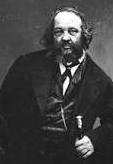News > Marx and Bakunin
 Responsible for digital edition: Genossenschaft Arpa-Info
Responsible for digital edition: Genossenschaft Arpa-InfoElectronical processing: ARPA Data GmbH
 Karl Marx  Mikhail Bakunin  Fritz Brupbacher |
Description: Brupbacher writes to his book: "On 20 August 1913, the publisher ‚Munich Post' released my book, ‚Marx and Bakunin'. It was originally intended as a summary of the history of the International and should make known the Bakuninist ideas in the German language area. During the work it became something else: the story of the death of anarchism under the influence of large-scale industry and the resulting decrease in the feeling of freedom and the activity of the workers. Marx could kill Bakunin, because the followers of Bakunin were beaten to death by big industry, the big industry, that mentally decimated the proletariat. For this spiritually decimated proletariat adapted the Marxist ideology was convenient. Marx won because the proletariat mentally shrank." That was the basic melody of the book. The book caused quite a stir. Anarchists and Marxists felt hurt their religious feelings. The godlessness of the book violated the believers of all persuasions. To the smallest social democratic local papers poured a flood of insults on the author of the book. " The present edition is a textual unmodified reprint of "Marx and Bakunin", first published in 1913, Munich, by G. Birk. About the author: Fritz Brupbacher (1874-1944) is one of the most fascinating and most original figures of the Swiss labor movement. Ever the rebel, and "revolutionary" - as he called himself - he was a life in opposition to the established party sizes and officials of the labor movement. The Zurich doctor working in 1901 sparked a scandal, because he called for a counseling center for women and gratuitous means of protection against unwanted pregnancies. In his practice, he learned the real plight of the workers know and came to the conclusion that he "had nothing more to look on the middle classes of the barricades." He was expelled as a revolutionary permanently from both the Social Democratic Party (1914) and the Communist Party (1933). All his life he saw his main task in the education of the workers to a liberal socialism that was the epitome of humanism completely unfolded for him. Search possibilities: Through the presentation of articles and the options available, which is provided by the arpa search technology, a variety of relationships can be exploited in the text. Please, send us your experiences and desires in order to optimize the development. |
Tools
| Veröffentlicht 15:39:00 08.05.2013 |
AH-WEB, Adrian Hetzke |
